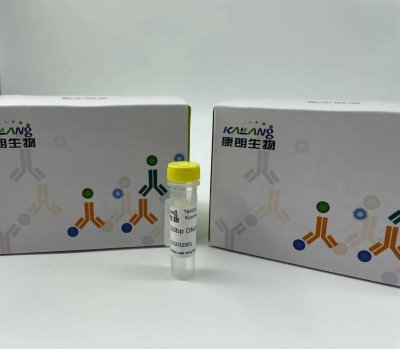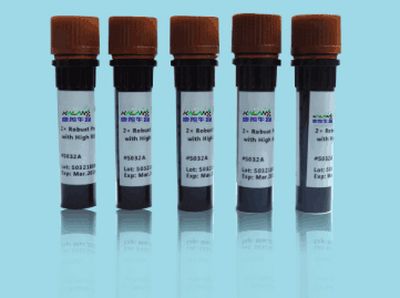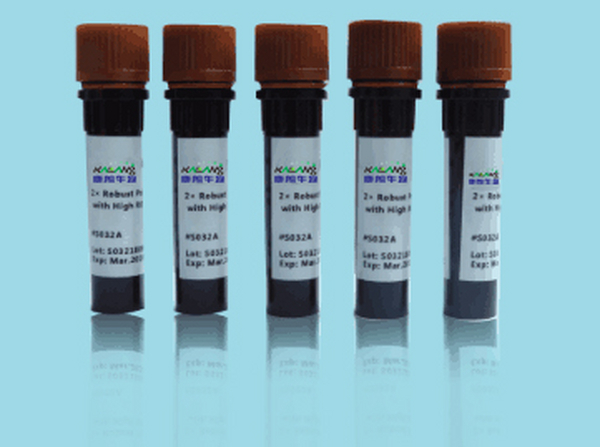QQ:3002763590


客服电话:021-61998208
PRKRA rabbit Polyclonal Antibody
PRKRA抗体
PRKRA抗体应用:WB 1:500-2000 ELISA 1:5000-20000protein activator of interferon induced protein kinase EIF2AK2(PRKRA) Homo sapiens This gene encodes a protein kinase activated by double-stranded RNA which mediates the effects of interferon in response to viral infection. Mutations in this gene have been associated with dystonia. Alternative splicing results in multiple transcript variants. [provided by RefSeq, Nov 2008],
PRLR rabbit Polyclonal Antibody
PRLR抗体
PRLR抗体应用:WB 1:500-2000 ELISA 1:5000-20000prolactin receptor(PRLR) Homo sapiens This gene encodes a receptor for the anterior pituitary hormone, prolactin, and belongs to the type I cytokine receptor family. Prolactin-dependent signaling occurs as the result of ligand-induced dimerization of the prolactin receptor. Several alternatively spliced transcript variants encoding different membrane-bound and soluble isoforms have been described for this gene, which may function to modulate the endocrine and autocrine effects of prolactin in normal tissue and cancer. [provided by RefSeq, Feb 2011],
PROF1 rabbit Polyclonal Antibody
PROF1抗体
PROF1抗体应用:WB 1:500-2000 ELISA 1:5000-20000profilin 1(PFN1) Homo sapiens This gene encodes a member of the profilin family of small actin-binding proteins. The encoded protein plays an important role in actin dynamics by regulating actin polymerization in response to extracellular signals. Deletion of this gene is associated with Miller-Dieker syndrome, and the encoded protein may also play a role in Huntington disease. Multiple pseudogenes of this gene are located on chromosome 1. [provided by RefSeq, Jul 2012],
PROF2 rabbit Polyclonal Antibody
PROF2抗体
PROF2抗体应用:WB 1:500-2000 ELISA 1:5000-20000profilin 2(PFN2) Homo sapiens The protein encoded by this gene is a ubiquitous actin monomer-binding protein belonging to the profilin family. It is thought to regulate actin polymerization in response to extracellular signals. There are two alternatively spliced transcript variants encoding different isoforms described for this gene. [provided by RefSeq, Jul 2008],
PROL4 rabbit Polyclonal Antibody
PROL4抗体
PROL4抗体应用:WB 1:500-2000 ELISA 1:5000-20000proline rich 4 (lacrimal)(PRR4) Homo sapiens This gene encodes a member of the proline-rich protein family that lacks a conserved repetitive domain. This protein may play a role in protective functions in the eye. Alternative splicing result in multiple transcript variants. Read-through transcription also exists between this gene and the upstream PRH1 (proline-rich protein HaeIII subfamily 1) gene. [provided by RefSeq, Feb 2011],
PROM2 rabbit Polyclonal Antibody
PROM2抗体
PROM2抗体应用:WB 1:500-2000 ELISA 1:5000-20000prominin 2(PROM2) Homo sapiens This gene encodes a member of the prominin family of pentaspan membrane glycoproteins. The encoded protein localizes to basal epithelial cells and may be involved in the organization of plasma membrane microdomains. Alternative splicing results in multiple transcript variants. [provided by RefSeq, Oct 2009],
PROP1 rabbit Polyclonal Antibody
PROP1抗体
PROP1抗体应用:WB 1:500-2000 ELISA 1:5000-20000PROP paired-like homeobox 1(PROP1) Homo sapiens This gene encodes a paired-like homeodomain transcription factor in the developing pituitary gland. Expression occurs prior to and is required for expression of pou domain transcription factor 1, which is responsible for pituitary development and hormone expression. Mutations in this gene have been associated with combined pituitary hormone deficiency-2 as well as deficiencies in luteinizing hormone, follicle-stimulating hormone, growth hormone, prolactin, and thyroid-stimulating hormone. [provided by RefSeq, Sep 2011],
PROS rabbit Polyclonal Antibody
PROS抗体
PROS抗体应用:WB 1:500-2000 ELISA 1:5000-20000protein S (alpha)(PROS1) Homo sapiens This gene encodes a vitamin K-dependent plasma protein that functions as a cofactor for the anticoagulant protease, activated protein C (APC) to inhibit blood coagulation. It is found in plasma in both a free, functionally active form and also in an inactive form complexed with C4b-binding protein. Mutations in this gene result in autosomal dominant hereditary thrombophilia. An inactive pseudogene of this locus is located at an adjacent region on chromosome 3. Alternative splicing results in multiple transcript variants encoding different isoforms that may undergo similar processing to generate mature protein. [provided by RefSeq, Oct 2015],
PROX1 rabbit Polyclonal Antibody
PROX1抗体
PROX1抗体应用:WB 1:500-2000 ELISA 1:5000-20000prospero homeobox 1(PROX1) Homo sapiens The protein encoded by this gene is a member of the homeobox transcription factor family. Members of this family contain a homeobox domain that consists of a 60-amino acid helix-turn-helix structure that binds DNA and RNA. The protein encoded by this gene is conserved across vertebrates and may play an essential role during development. Altered levels of this protein have been reported in cancers of different organs, such as colon, brain, blood, breast, pancreas, liver and esophagus. Alternative splicing results in multiple transcript variants. [provided by RefSeq, Jul 2012],
PRP16 rabbit Polyclonal Antibody
PRP16抗体
PRP16抗体应用:WB 1:500-2000 ELISA 1:5000-20000DEAH-box helicase 38(DHX38) Homo sapiens DEAD box proteins, characterized by the conserved motif Asp-Glu-Ala-Asp (DEAD), are putative RNA helicases. They are implicated in a number of cellular processes involving alteration of RNA secondary structure such as translation initiation, nuclear and mitochondrial splicing, and ribosome and spliceosome assembly. Based on their distribution patterns, some members of this family are believed to be involved in embryogenesis, spermatogenesis, and cellular growth and division. The protein encoded by this gene is a member of the DEAD/H box family of splicing factors. This protein resembles yeast Prp16 more closely than other DEAD/H family members. It is an ATPase and essential for the catalytic step II in pre-mRNA splicing process. [provided by RefSeq, Jul 2008],
最新动态
-

Anti-GNGT1 KL20092-001(50ul)
2021-10-11 -

Anti-GNGT1 antibody(50ul) KL20093-001
2021-10-11 -

MUC5AC (PT2058) mouse Monoclonal Antibody
2021-01-06 -

mOrange mouse Monoclonal Antibody(Mix)
2021-01-05
热门标签
- Histone H3 rabbit Polyclonal Antibody Histone H3抗体
- EGFR rabbit Polyclonal Antibody EGFR抗体
- Cy3 Conjugated
- AbFluor™ 555 Conjugated
- AbFluor™ 680 Conjugated
- AbFluor™ 350 Conjugated
- AbFluor™ 647 Conjugated
- AbFluor™ 594 Conjugated
- AbFluor™ 405 Conjugated
- Cy5 Conjugated
- AbFluor™ 488 Conjugated
- Cyclophilin B抗体 Cyclophilin B Monoclonal Antibody(2B10)
- COX IV抗体 COX IV Monoclonal Antibody(6C8)
- PCNA抗体 PCNA Monoclonal Antibody(12D10)
- FAK rabbit Polyclonal Antibody FAK抗体
邮箱:3002763590@qq.com
电话:021-61998208

扫码关注微信公众号






